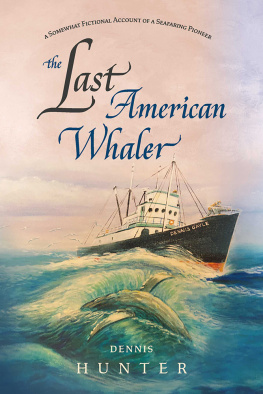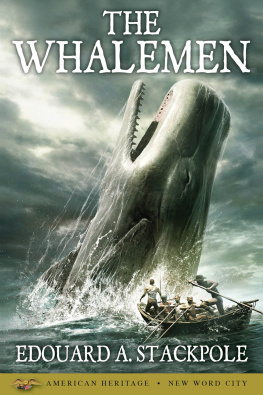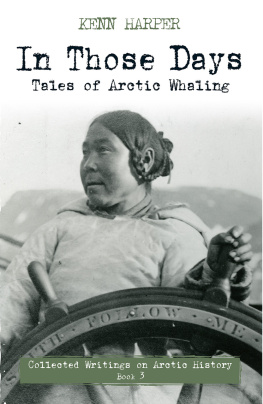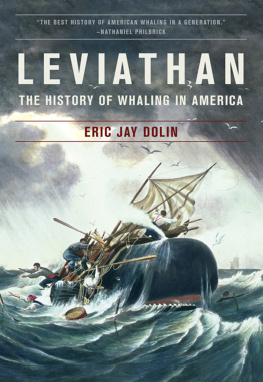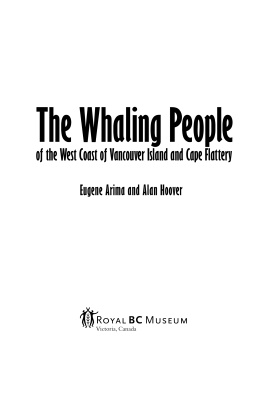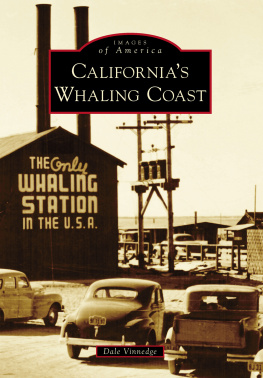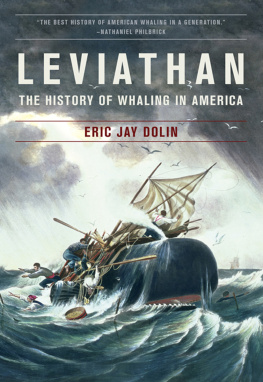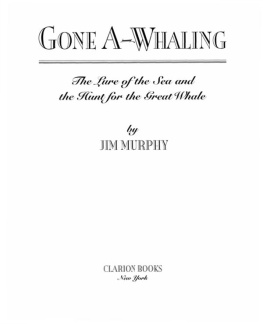Dennis Hunter. All rights reserved. No part of this publication may be reproduced,
distributed, or transmitted in any form or by any means, including photocopying, recording, or other electronic or mechanical methods, without the prior written permission of the author, except in the case of brief quotations embodied in critical reviews and certain other noncommercial uses permitted by copyright law.
ISBN (Print): 978-1-09837-454-9
ISBN (eBook): 978-1-09837-455-6
Preface
Ever since the beginning of time, man has pitted himself against the power of the sea to learn its secrets and solve its mysteries. Many stories have been told of the ships and the men who sailed them; of sea beasts and the men who hunted them.
from the movie trailer for the 1956 Movie: Moby Dick
O nce there were as many as 750 whaling ships in the United States when the industry was at its peak. In those days whaling was a substantial part of the economy of such New England communities as Nantucket and provided the base for some of the great American stories of adventure on the high seas. Who could forget the Herman Melville tale, written in 1851, of Captain Ahab and his search for the giant white whale Moby Dick !
Commercial whaling in the United States dates back to the seventeenth century, but the industry in the twentieth century dwindled down to a precious few whaling adventurers on the northwest coast of California.
This is a story of one of those adventurers, Captain Gib Hunter, a true American whaling and fisheries pioneer of the twentieth century as seen through the eyes of his oldest son. It is a somewhat fictional account which attempts to stay true to events as remembered. But as memories are fading over the years, the author has attempted to write a story that will entertain as well as educate the reader.
The book contains vivid descriptions of whaling which by todays standards might seem barbaric, but please remember that until 1971, whaling was indeed an important part of our history. Each whale was killed humanely. In fact, strict regulations limited the taking of whales under a certain size and only 100 whales could be taken by each boat during a six-month season.
Up until the 1970s, whale meat was processed into pet and livestock food. In fact, for a time, whale meat was substituted for horse meat to produce dog food. Oil from the sperm whale had high demand and was utilized in cattle feed, industrial hydraulics and perfumes while the ground-up whalebone went into poultry food. No part of the whale would go wasted.
In 1971, the Federal Government called for an ending of American whaling. The Marine Mammal Protection Act made it illegal for any person residing in the United States to kill, hunt, injure or harass all species of marine mammals, regardless of their population status.
Therefore, on December 31, 1971, when Gib Hunter stepped off the deck of the whaler Dennis Gayle , he became known as the last American whaler.
Prologue
Present Day
A s the sun was starting to set on the vast Pacific Ocean, the old man was not happy. The listless sea was beginning to churn into something he could not control. He knew the ocean flowed with different personalities. Calm and cool one moment; furious and ferocious the next. In his seventy years at sea, he could begin to read the various currents and could predict what the ocean had in store. But, this was one day the mighty Pacific had a terrible surprise. She was about to lose her temper in a big way.
The waves were getting taller, rapidly growing to 10, 15, 20-feet and higher. From the deck of the small fishing boat, they looked as high as three-story buildings. Imagine slowly climbing all those stairs and then suddenly falling into nothingness until you slammed into the raging sea! The Pacific Ocean was definitely throwing a tantrum! Gale force winds started to toss the old mans 55-foot craft around. All the signs of a big storm were there. The ominous dark clouds began to form in the west, monstrous sculptures that portended impending doom. Sheets of lightning blazed in concert with the roaring thunder. As the boat was tossing and turning, the old veteran skipper tried to keep a weather eye out. He had just listened to the frequent weather reports on the radio which were opposite of the picture he saw of an angry sea. Damn! What the devil were they thinking, putting out that latest report , he thought. I should have listened to my gut and headed in much earlier . Everything he had learned and had been taught told him that this was going to be a much worse storm than expected. These rapidly-deteriorating conditions could close his path home and reminded him of a storm that happened on his first ocean adventure. As the boats Captain, Gib Hunter felt a deep responsibility to get his crew, asleep in their bunks, safely home. He wondered if they could make it. There was always hope. But then, the mountains of water came.
C hapt e r O ne
Central Oregon Coast 1930-1931
H ope. The old skippers mind drifted back to when he was just twelve years old at which time he first felt the first pangs of yearning for the sea. Gib Hunter and his family lived on a houseboat along the Alsea River, several miles inland of Waldport, a small fishing port on the central Oregon coast. The houseboat wasnt much to look at, but it floated and was roomy enough for the family of five. It stood two stories high with three bedrooms, a small galley, bathroom and living room highlighted by the rustic Captains chair and steering wheel as its most becoming features.
Gib, his brothers Bill and Glenn and their sister Agnes started their day at the breakfast table as they did every morning. By this time, their father, Will, had already headed for work. Their mother, Flora Mae, insisted on making sure that her kids began each day with home-made oatmeal with plenty of sugar and butter on top. Flora Mae was wearing her favorite pink and white apron, as always, when she served breakfast. She had a very pleasant matronly look, but her children always knew when she meant business! Mom! Its too sunny outside to have oatmeal, said Gib. Looking toward the others, he started to stand up and said, Cmon guys, lets get going!
His younger brother Glenn, with a mouthful of oatmeal, glanced toward Agnes and said Wait a minute. I dont want Agnes tagging along. Shell just slow us down. We dont need girls! As the three boys started to leave the table, Agnes was a little put out! Whatcha mean? I wanna go! she cried. Tears started streaming down her cheeks.
Flora Mae staved off any argument by persuading Agnes to stay behind. As she wiped the tears from Agness face, Flora Mae gently held both her cheeks, looked her in the eyes and whispered with a wink, We gals have something special to do, dont we, Agnes? Let boys be boys! Know what I mean? Were going shopping in Newport. Then, Ill show you how to make a lemon meringue pie. Flora Mae was famous for her lemon meringue pies and she was pleased that she could pass along her recipe to her young daughter. Agnes immediately stopped crying and thought, she didnt want to go with those three hoodlums anyway! At that moment, the three young boys started to jump away from the table, Flora Mae stopped them and said Sit down and hold your horses, boys! The day will wait. Finish your oatmeal. Its good for you! How many times had they heard that line before? But, the boys knew never to say no to Flora. Reluctantly, they ate their oatmeal.
A few minutes later, after they dutifully kissed their mom goodbye and glared at their younger sister, the three brothers were skipping along the streets of the small town of Alsea, kicking cans back and forth along the sidewalk with Glenn yelling Dont step on the cracks!

